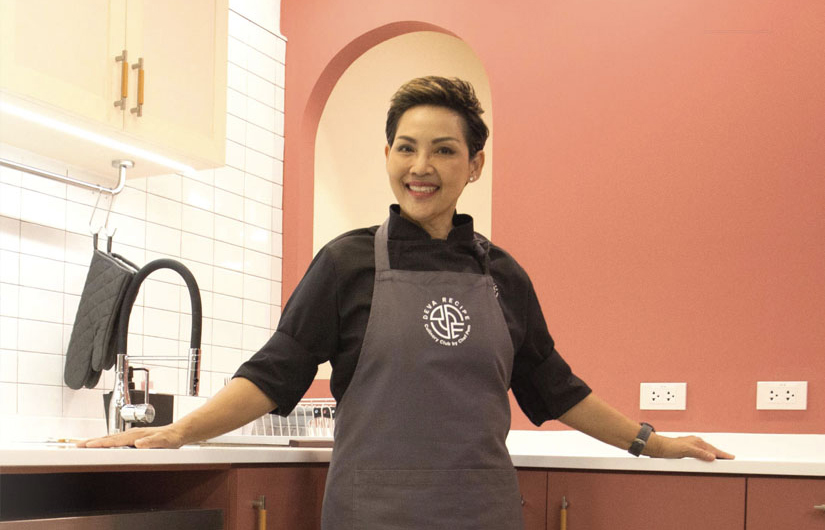She has been an MC, singer, actor, food judge and chef, and now, in no way ready to slow down or stop, she has opened a cooking school. And why has ML Kwantip Devakula, better known as Chef Pom, decided to invest in such a venture in the current economic climate? She must have an interesting reason. This is why the Elite+ team was quite pleased when she accepted our request to visit this celebrity chef in her classroom kitchen.
The school’s name is Deva Recipe by Chef Pom, and it is located on the third floor of Seacon Square shopping mall on Srinakarin Road in Samut Prakan on the fringes of Bangkok. After watching Chef Pom teach a class how to prepare the sweet, sticky rice dessert “Khao Niew Mun Na Kung” with the assistance of Chef Golf, we sat down together to talk, and the first thing we realised is she is nothing like the fierce, sometimes brutal judge we have seen when watching “MasterChef Thailand”.
Chef Pom began by saying she never wanted to be a chef, but from an early age she learned to cook as she had to help at home. Over time, she just absorbed more and more knowledge and developed her skills. She then went on to say, “I wouldn’t truly say cooking is my profession. First of all, whatever I have done or do, I must enjoy. If it feels too much like work and burdensome and boring, I will stop. When I was young, I wanted to escape the kitchen and turned to acting and singing. Later, when not forced, I began to enjoy cooking once more, but more than this, I love to teach.”
So, next we began to talk about Chef Pom establishing her cooking school and how serious this project is for her.
“The school sort of formed on its own. At first, I worked with the Heliconia H Group, the producers of MasterChef Thailand and Iron Chef Thailand, and would come to teach from time to time. I taught small classes because I wanted to develop a close rapport with my students.”
When asked what sets Deva Recipe by Chef Pom apart from other cooking schools, Chef Pom responded, “First of all, like our name implies, the recipes we teach all come from the Devakula family. Next, anyone who comes here must be ready to work and enjoy what they are cooking. If they enjoy it, they will learn and absorb like I did.”
We next asked if she encountered any problems when teaching members of the new, younger generations how to prepare traditional Thai cuisine. As a teacher, did she need to develop new methods and techniques?
“No, not at all. Everyone who comes to study here is committed. They come because they want to learn. We just try to keep things from getting stressful. If a student is having problems, we prepare a dish together. When done, we say this is how the dish should taste, but when you go home, you can make adjustments and add anything you want to make it more your own.
" After this, we wanted to hear what Chef Pom thought of what we have been hearing about Thai cuisine as a soft power. She said, “Thai food definitely can be seen as a soft power to promote Thailand and Thai culture. It is unique, offers blends of flavour that charm and excite. Once a foreigner has been introduced to Thai food, they are usually won over. We have such dishes as vegetables served with one of many different chili pastes, made with dried prawn or mackerel, to name a couple. Then we have curries prepared both with and without coconut milk. A meal should consist of dishes that are sour, sweet, salty, spicy and oily.
_817303330.jpg)
Bearing this in mind, we next asked what are the key points of her cooking school. Chef Pom went on to say, “I want to promote, or let’s say encourage, traditional Thai family dining, where and when everyone comes home to eat and spend some quality time together. If some who come to study take away what they have learned and try to sell some of these dishes, I am truly happy. I’m not looking for any credit. I just want everyone to enjoy themselves.”
What we must remember is that while food preparation can be a culinary art, a school is still a business. We then wanted to know what Chef Pom thought about this. She answered, “I don’t look at the school in this way at all. It’s just something I enjoy doing. I’m not here to make a profit, and I am fortunate that Seacon Square has supported me in this endeavour.”
Next, Chef Pom shared with us what she thinks the word chef means and why she has always wanted to escape this. “I don’t want to call myself a chef because I believe it comes with responsibility. A chef has to be concerned with ingredients and costs as well as managing their staff. It’s a lot more than just preparing and serving a dish.”
_549578718.jpg)
To conclude our interview, we asked Chef Pom how much longer she thought she would be working as a chef. “As I said before, I don’t consider myself a chef, but because of my passion for food, I plan to share what I know up to my last breath.”
Chef Pom continues to be a judge on MasterChef Thailand while also producing a regular program, “High Class Kitchen” she posts on YouTube. She is fortunate to have one of her former students, Chef Golf – Worranan Boonritdech, to help her run her school, Deva Recipe by Chef Pom.
_783465125.jpg)





















































































































































































































































































































































































































































































































































































































































































































































































































